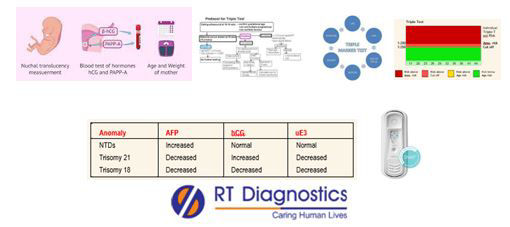Triple Test (II Trimester)
A triple Blood test performed in the 15-17 weeks of Pregnancy. This test screens the three elements in the blood called alpha-fetoprotein, human chorionic gonadotrophin, and estriol. This test is used to detect the risk of the baby having Down syndrome and other defects.
Triple Test:
Why Triple Test Test?
CLINICAL INFORMATION
A triple test (also known as a triple marker screen test or Bart’s test or Kettering test) is a blood test performed during pregnancy (between 15 to 21 weeks). The test results of this test reflect the status of the developing fetus in the pregnant mother’s womb. The levels of AFP (amniotic fluid – amniocentesis for cell-free fetal DNA), hCG and estriol (unconjugated) are estimated in this triple test. Thus the purpose of the test is to screen for abnormal pathologies during embryonic developments or anomalies (abnormal organogenesis) etc such as neural tube defects (Maternal Serum AFP or SMAFP in conjunction with diagnostic procedures such as ultrasound and amniocentesis detects neural tube defects at 16 to 18 weeks of pregnancy i.e nuchal translucency), syndromes with genetic disorders such as trisomy 18, Down’s syndrome (low AFP and estriol but have high hCG) etc. Abnormal triple test results can be assessed with Ultrasound and amniocentesis. Moreover, abnormal triple tests can alert physicians about the increased risk of other pregnancy complications. While a normal triple test value does not always guarantee having a healthy baby. Beta HCG is secreted by the placenta and its function in early pregnancy is to maintain the corpus luteum (helps in sustaining the levels of progesterone). PAPP-A (Pregnancy Associated Plasma Protein -A) is secreted by the placenta and its levels are elevated as the pregnancy progresses. The probability of abnormal birth defects in pregnancies can rarely occur among normal pregnancies and such possibilities are higher with an increase in the risk of certain factors involved in it, such as inherited hereditary diseases (congenital disabilities, inborn errors of metabolism etc) that run in certain families etc. Thus, these birth defects in pregnancies can range in severity ranging from anatomical abnormalities (anomalies) to serious mental retardation. Therefore genetic screening can help in the prevention of such abnormal (developing fetus) pregnancies and can help abort (during initial trimesters of pregnancy – most likely from 9 to 13 weeks of gestation) delivering such defective children (who would otherwise suffer for the rest of their lives along with their parents). A double marker test and NT Scan (Nuchal Translucency test confirms the diagnosis of genetic abnormalities) are performed during the first trimester. Even though their test is not always mandatory in all pregnancies. However if the woman is pregnant over 35 years and/or pregnant for the first time, then this test helps in the assessment i.e if the unborn baby is at risk of chromosomal abnormalities (chromosomal malformation) associated with (neurological defects) mental disorders such as Down’s syndrome, Trisomy 18, Edward’s syndrome, mental retardation and/or severe birth defects. This test is done with an ultrasound and blood sample specimen for two tests. Thus this Double Marker Test (also called as Maternal Serum Screening Test/Dual Marker Test) looks for two markers namely – free beta HCG and PAPP-A. High levels of beta HCG and/or low levels of PAPP-A are indicative of chromosomal abnormalities in a developing fetus. Hence a double marker test is a screening test in pregnancy that is a useful tool to determine the healthy development of a fetus. Meanwhile, there are also more such tests available such as quadruple tests also called quad screen or tetra screen (preferably performed during the second trimester – estimates the levels of AFP, HCG, Estriol and Inhibin A) etc. Additional tests include Amniocentesis, Chorionic villus sampling, karyotyping etc.

General Instructions:
Sample Requirement: Specimen - Blood sample collected from the vein. Test Preparation: None.
NOTE - Sample for specimen collections may vary based on the patient’s condition/cases according to patient’s presenting complaints/signs or symptoms:
SPECIMEN REQUIREMENT (Special or Rare Cases) - As instructed and guided by Physician / Clinician / Pathologist / as per Laboratory’s requirements, according to procedures and protocols.
This Multi-Specialty Clinical Referral Laboratory RT DIAGNOSTICS provides precise and accurate tests with an extensive range of testing services to the medical centres to help in the diagnosis and identification of pathology in the test specimens for infectious diseases and also to evaluate the function of organ systems of the patient. It prevents further complications and helps to stabilize and restore health to near normalcy at the earliest without delay.



